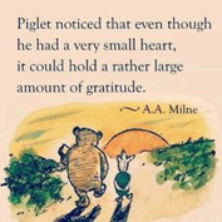
I was recently asked how CLL had changed my life. As I reflected upon this question, I realized that while CLL certainly had changed my life in terms of doctor appointments, medications, and a good amount of research to understand the disease, more importantly, CLL had changed ME.
As with most, hearing the diagnosis of cancer stopped me in my tracks. That was more than nine years ago. After the initial shock, however, life began to change for me in unexpected ways. There were tangible life changes, of course, big and small. While some were difficult, and a few were downright heartbreaking, I have come to realize the blessings they brought my way. There is nothing like facing one’s own mortality to put things into proper perspective.
I have learned not to sweat the small stuff. So what if that full glass of red wine spilled on the carpet, or that cherished antique plate fell to the floor and smashed into a million pieces? What does it really matter?
What matters, I have learned, is the people in our lives—the small moments of connection—the big life experiences that create beloved memories—and everything in between.
Through CLL, I have discovered who my steadfast friends are, and have gained many new ones as well. I have learned that spending time with friends is more important that a clean house or an extra hour or two at work.
I have learned to live more in the moment, instead of worrying too much about what the next day or the next year may bring.
I have learned that I have much for which to be grateful.
 I remember when my first grandchild was born nine years ago. I was so very thankful to have lived long enough to see her born. Now, I have three granddaughters. They bring so much laughter and fun into my life and I never miss an opportunity to play a game of Candyland, be the guest at a princess tea party, or build a tent under the dining room table. It’s all magic and make-believe through the eyes of a child. Life doesn’t get much better than that.
I remember when my first grandchild was born nine years ago. I was so very thankful to have lived long enough to see her born. Now, I have three granddaughters. They bring so much laughter and fun into my life and I never miss an opportunity to play a game of Candyland, be the guest at a princess tea party, or build a tent under the dining room table. It’s all magic and make-believe through the eyes of a child. Life doesn’t get much better than that.
These are the days I thought I would never see. With 17p53 deletion at 98 percent upon initial CLL diagnosis, my prognosis was poor to say the least. But here I am nine years later—still working, still vibrant. I am grateful.
I’m grateful to the doctors, scientists, and research professionals who have dedicated their lives to changing mine. What was once a pretty depressing and limited future with the only hope being a stem cell transplant with all its possible complications, is now a hopeful future that requires only a few gray pills daily to keep the CLL beast at bay.
I am grateful for the friends I have made along the way in my CLL journey—friends who also face CLL but who take the time to share their experience and knowledge to educate and encourage me. I’ve learned so many things that have helped me get the best treatments and to manage my disease effectively. And, by example, they have made me a kinder and more giving person I think. I’m learning to pay it forward.
Although CLL may bring new challenges to me in the future, I remain hopeful. And, I choose to live in gratefulness for all I have gained in this journey. More than ever, I can say it’s a wonderful life.
It was discovered I had CLL in July of 2006 during a routine blood test. I was referred to a local hematologist. After researching online and discovering that there was a blood test call FISH that provided information that would impact future treatment options and provide prognostic guidelines, I called the hematologist office to get the test. They had never heard of it. I again searched the internet and read the CLL online forums and discovered a CLL specialist in my area. That has made all the difference. Getting the FISH test with the CLL specialist, it was revealed that I was 17p deleted and unmutated—a finding that suggested future treatment difficulty. I began treatment in February 2012 based on a diagnosis of autoimmune hemolytic anemia. I opted to enter a clinical trial at the National Institutes of Health in Bethesda, MD for a new treatment called PCI-32765, now call Ibrutinib or Imbruvica. I continue to do well on this treatment and am in a partial remission.
Originally published in The CLL Tribune Q4 2015.

















